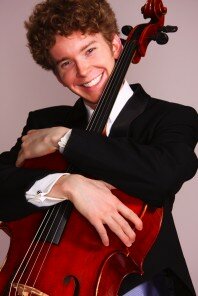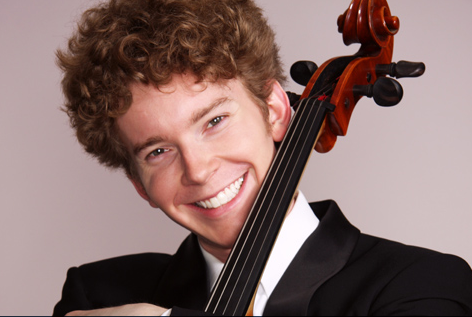Joshua Roman and an all-cello ensemble perform music by Mason Bates, Richard Strauss, Astor Piazzolla, Hector Villa-Lobos, Arvo Pärt, and Led Zeppelin at Town Hall Seattle on Tuesday, June 19, 2012, at 7:30 p.m.
Cellist Joshua Roman has been making waves in Seattle since 2006, when he was named principal cellist of the Seattle Symphony. After a two-year tenure with the Symphony, Roman left to pursue a solo career, but has remained a strong force in the local classical music scene. As artistic director of Town Hall’s popular TownMusic concert series, he’s brought innovative classical music programming to Seattle audiences, with a special focus on new music and emerging artists.
The 2011-12 TownMusic season concludes this Tuesday with an all-star cello concert featuring Roman and seven prominent local cellists. The diverse program spans centuries and genres, including Strauss art songs, Piazzolla tangos, and a Led Zeppelin cover arranged by Roman himself. Performances feature a variety of cello ensembles, ranging from solo cellist to cello octet.

The highlight of the evening will be the world premiere of a work for solo cello by composer Mason Bates, continuing the TownMusic tradition of premiering a commissioned work at the final concert of each season. An acclaimed performer, composer, and DJ, Bates is taking the classical music world by storm with his unique blend of orchestral and electronic sounds.
Roman plans to carry TownMusic’s winning blend of ambitious programming, exciting new works, and emerging talent into the upcoming 2012-13 season. “Next season will retain the diversity of style and era that has been showcased in previous seasons, but with a few twists,” he said, writing from Nova Scotia, where he recently completed a two-week residence at the Scotia Festival of Music. “There will be familiar faces as well as some new ones that we’re excited to introduce to Seattle.”
Although next season’s lineup won’t be revealed until Tuesday’s concert, Roman hinted at the surprises in store. “We’re adding the element of humor. It’s something which we can all relate to, and is often overlooked during our pursuit of the ‘seriousness’ in music.”
TownMusic’s owes much of its success to Roman’s fresh perspective on classical music. To him, it’s a continually evolving art form that honors the past while adapting to the current cultural climate. “If you really look at the history of classical music over the last few centuries, rather than just the last 50-60 years, you see that one of its biggest strengths has been the ability to adapt to cultural changes and needs. Sometimes ahead of the curve, and sometimes with a bit of a lag, but always changing.”
This viewpoint has inspired him in the choices he’s made with TownMusic. The series offers something for everyone, from world-class performances of chamber music favorites to genre-blending new works inspired by rock, pop, electronica, and jazz. Often, music representing these two extremes appears in the same concert program.
Roman emphasizes the importance of experimentation in his role as TownMusic artistic director. “There is a way of thinking that is ‘this is how it’s been done, and so it should always be done this way’, but I think that is an unproductive mode to be in. These days, as orchestras are trying new things every season, its easy to see the need for flexibility as a presenter.”
The concept of flexibility extends to Roman’s view of himself as a performer. “I think we need to be adapting more as musicians. The era of recording changed the game and brought new levels of technical proficiency and competition to all corners of the music world, but in the pursuit of ‘perfection’ some important musical elements can become undervalued. Great musicians of the past wrote, played, and presented music, even if they were better at one than the others.”
Roman stresses the importance of these skills to today’s classical musicians. “In my own experience, writing music has helped me understand more of how a composer might think, and therefore enhanced my interpretations and ability to focus on the ‘what’ and ‘how’ in music, not just try to hit each note perfectly.”
Tuesday’s concert perfectly embodies Roman’s philosophy of musical flexibility, incorporating his talents as a performer, arranger, and concert presenter. Though he will be performing as a soloist, Roman is also enthusiastic about his role as a collaborative musician. “I’ve chosen some points during the concert to highlight the other cellists in the core quartet, so I’ll get to play ‘second fiddle’ on several of the pieces, something I’m really looking forward to.”
The concert isn’t just an opportunity to grow musically. For Roman, it’s a labor of love. “(It’s) something I have wanted to put on at Town Hall Seattle for a few years now,” he said. The concert pays tribute to the cello, showcasing what Roman describes as “its inherent range of expressivity, color, and sexiness”. “The cello is not only a unique voice, but a versatile one, so the repertoire was chosen to reflect this ability to be vocal, to be rhythmic, to be ethereal, and to rock out.”
Roman relishes this opportunity to collaborate with others who share his passion for the cello. Among the cellists joining him on stage are several Seattle Symphony members, including current principal cellist Efe Baltacigil. It’ll be a veritable Seattle cello family reunion. “It is a great joy to work with colleagues you haven’t seen in awhile. Cellists tend to be a cool bunch of musicians to hang with!”
